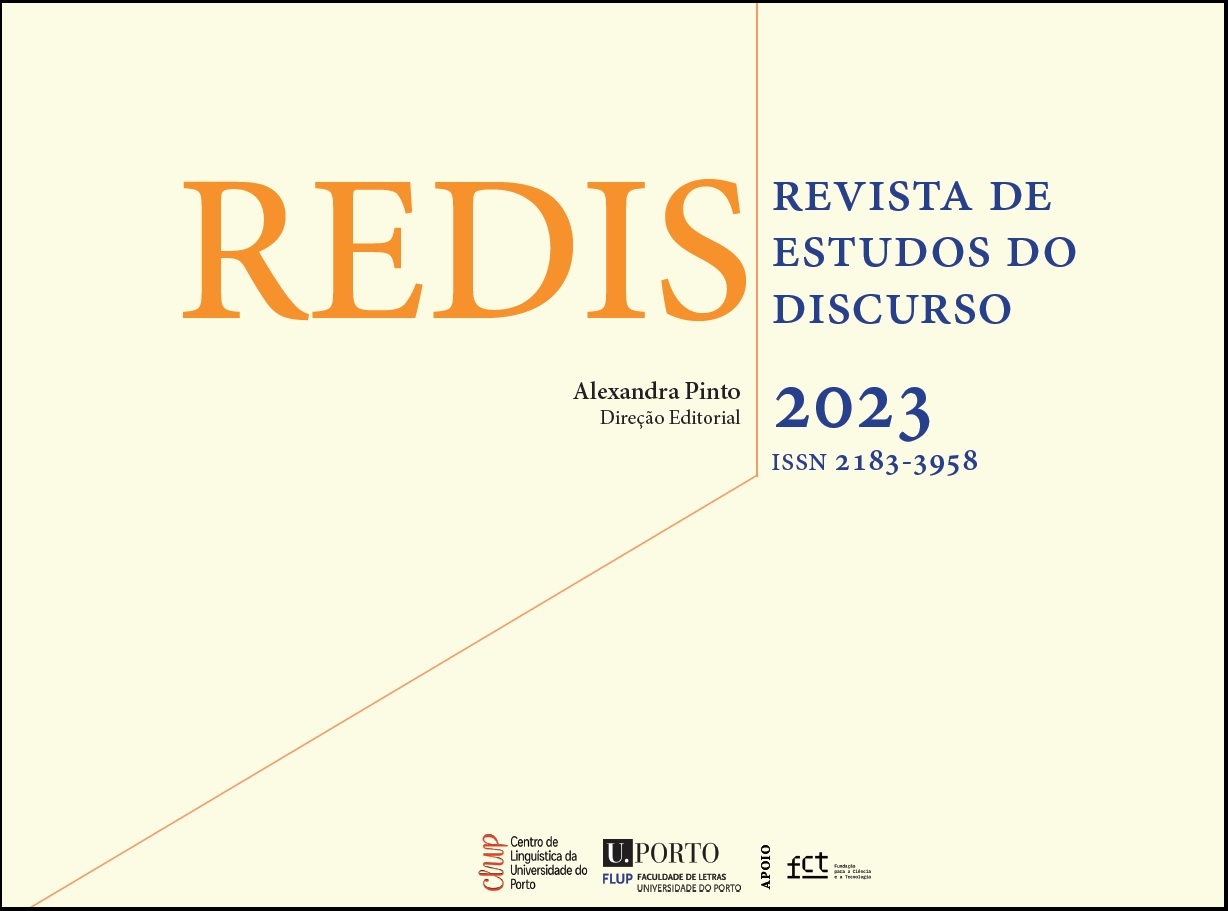O discurso fundamentalista cristão no Governo Bolsonaro: uma análise de enunciados do Twitter
DOI:
https://doi.org/10.21747/21833958/red12a2Palavras-chave:
Fundamentalismo religioso, Discurso político, Regimes de verdade, Ressentimento, DemocraciaResumo
Este artigo examina a atualidade das práticas discursivas que articulam o religioso ao político com o objetivo de analisar as condições de possibilidade de emergência do discurso funda- mentalista cristão no Governo Bolsonaro materializado no Twitter, no período de 2018 a 2022. Para tanto, teórica e metodologicamente, mobilizaremos uma arqueogenealogia das relações de saber e poder que inscrevem essas discursividades no interior de confrontos sociais, sob a ótica dos Estudos Discursivos Foucaultianos. Recortamos do nosso arquivo para composição do corpus de análise seis enunciados veiculados por bolsonaristas que circularam na plataforma Twitter em 2018-2022. Como problemática relevante, o bolsonarismo se constitui, estrategicamente, manifestando formas de racionalidade e correlações de força que atravessam a esfera política com a crença em valores morais absolutos. Na economia desses discursos, emergem práticas fundamentalistas que tornam visíveis uma vontade de verdade alicerçada na universalidade dos saberes produzidos no exercício do poder, ameaçando a experiência democrática no Brasil. Dialogamos com as teses de Nietzsche (2009) e Sloterdjik (2019), mobilizando categorias como regimes de verdade, ressentimento e ideal ascético.
Referências
Almeida, R. (2017). A onda quebrada: evangélicos e conservadorismo. Cadernos Pagu, 50 (1), 1-27.
Almeida, R. (2018). Deuses do parlamento: os impedimentos de Dilma. Conservadorismos, fascismos e fun- damentalismos (1a ed). Editora da Unicamp.
Almeida, R. (2019). Bolsonaro presidente: conservadorismo, evangelismo e a crise brasileira. Novos estu¬dos CEBRAP, 38 (1), 185-213.
Armstrong, K. (2001). Em nome de Deus: o fundamentalismo no judaismo, no cristianismo e no isla- mismo. Companhia das Letras.
Burity, J. (2018). A onda conservadora na política brasileira traz o fundamentalismo ao poder? Con- servadorismos, fascismos e fundamentalismos (1a ed). Editora da Unicamp.
Chauí, M. (2006). Fundamentalismo religioso: a questão do poder teológico-político. Filosofia política contemporânea: controvérsias sobre civilização. Consejo Latinoamericano de Ciencias Sociales Clacso/ Departamento de Ciência Política-USP.
Ferreira, M. L. (2020). Evangélicos e Extrema Direita no Brasil: um projeto de poder. Revista Fim do Mundo, 1 (1), 46-71.
Foucault, M. (2011). Do governo dos vivos: Curso no Collège de France, 1979-1980: excertos. Achia- mé.
Foucault, M. (2017). Arqueologia do saber (8a ed). Forense Universitária.
Foucault, M. (2021). Microfísica do poder (11a ed). Paz e Terra.
Nietzsche, F. (2009). Genealogia da moral: uma polêmica (10a ed). Companhia das Letras.
Nietzsche, F. (2012). A Gaia Ciência (4a ed). Companhia das Letras.
Pérez Guadalupe, J. L. (2019). Evangelicals and Political Power in Latin America (1a ed). National Library of Peru.
Piovezani, C., & Gentile, E. (2020). A linguagem fascista (1a ed). Hedra.
Pleyers, G. (2020). A guerra dos deuses no Brasil: da teologia da libertação à eleição de Bolsonaro. Educação & Sociedade, 41 (1), 233-566.
Rocha J C (2021) Guerra cultural e a retórica do ódio Caminhos
Santos, B. S. (2014). Se Deus fosse um activista dos direitos humanos. Edições Almedina.
Sloterdijk, P. (2019). Pós-Deus (1a ed). Vozes.
Weber, M. (2013). A ética protestante e o espírito do capitalismo (15a ed). Martin Claret.
Downloads
Publicado
Como Citar
Edição
Secção
Licença
Direitos de Autor (c) 2023 Sandson de Souza Costa, Francisco Vieira da Silva

Este trabalho encontra-se publicado com a Licença Internacional Creative Commons Atribuição 4.0.
Os autores cedem à REDIS: Revista de Estudos do Discurso, o direito exclusivo de publicação dos seus textos, sob qualquer meio, incluindo a sua reprodução e venda em suporte papel ou digital, bem como a sua disponibilização em regime de livre acesso em bases de dados.




